with Aaron Te Hira-Mathie
The release of the new British book for World War III set my brain whirring as to a unique theme for a miniature of HRM’s finest. I quickly decided that the obvious standby of the black and green camouflage scheme, whilst iconic and well suited to our notional 1985 conflict, was a little too
pedestrian for my tastes. With the standard scheme discarded I started to tax my memory (and images on the internet) for a look that was still ‘British’ but that would tick the box for being a bit unique.
Because the new Challenger Mk.1 MBT and Warrior IFV plastic kits come with the applique armour as optional parts I considered going with an Operation Granby (1991 Gulf War) look, however I heard murmurs around the office that at least one of the other very talented staff members was
considering this option, so I felt that would be duplication… and that just wouldn’t do, however much I liked the idea of an arid theme.
Armed with a thematic concept I considered that the green and yellow ‘BATUS’ (British Army Training Unit Suffield – Canada) would make for an interesting semi-arid camouflage scheme. But for where?
I looked at my bookshelf, and it hit me, Oil War takes place in an arid environment and is part of our hypothetical mid-1980s war. Eureka!
The backstory for my Brits was born, if any of you heard my interview with Simon Berman from The Brush Wielders Union you’ll know that I like to create a little backstory as this helps me to develop a look and feel for a
painting project.
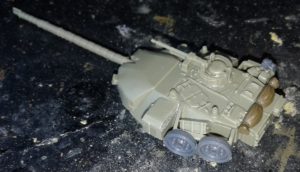
I decided this army should look ‘battleworn’, showing the signs of taking part in the bitter combat on the Middle East front. I wanted to do a proof of concept model, however the Challenger 1 models had yet to arrive here in
New Zealand, so I substituted a ‘Stillbrew’ equipped Cheiftain MBT in its place. At the same time I had an interesting idea for a Lynx AH.1 helicopter modified for this theatre of combat.
What follows Is a series of step by step photographs (and brief descriptions) detailing how these two models came into being.
Oil War themed British Main Battle Tank:
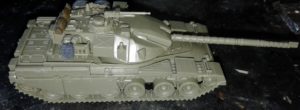
was putting together a tank that had some obvious wear as well as a ‘lived in’ look. So I cut off a couple of panels from each of the side armour shirts, and added some spare road wheels, Jerrycans and a cloth roll from my spares box.
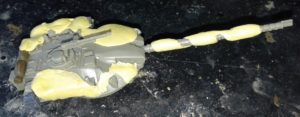
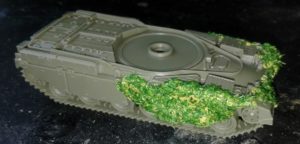
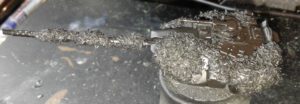
Step 4: I homogenised the colour of the model by spraying it with an all-enveloping coat of Vallejo black surface primer. This stage is a good idea as it gives the following paint something to ‘cling’ to as well as cutting down the likelihood of colour variations.

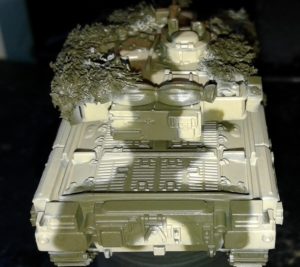
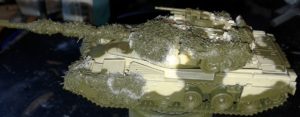
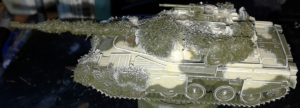
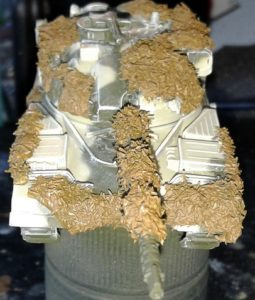
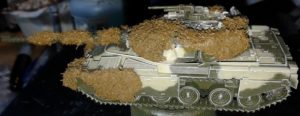
coat of Vallejo Model Colour 70.921 (English Uniform).
Step 9: Once all of the camouflage net elements are the same colour I liberally coat them with Vallejo Game Color 73.201 (Black Wash) to add some depth to camouflage nets.
Step 10: Once the black wash has completely dried I do a heavy drybrush of Vallejo Model Color 70.921 (English Uniform) so that only the very deepest recesses remain black.
Step 11: The camouflage netting looks fine at this point, however for a little extra definition I lightly drybrush them with Vallejo Model Color 70.873 (US Field Drab), concentrating on the most raised parts of the net texture.

Step 13: I paint the rubberised sections of the front guards with Vallejo Model Color 70.862 (Black Grey).
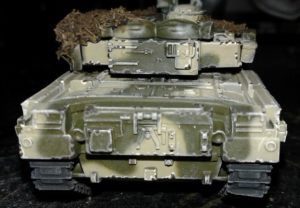
Step 14: To further add to the battleworn appearance of the model I add some chips and scrapes to the camouflage paint. To do this I paint small random shapes in likely high wear areas, such as around the bottom of track skirts, hatches/panels and on some corners, using Vallejo Model Color 70.837 (Pale Sand) on the yellow areas and Vallejo Model Color 70.886 (Green Grey) to simulate the paint wearing down in those spots.
Then I go back and paint spots of Vallejo Model Color 70.822 (German Camo Black Brown) over the previously ‘worn’ paint to simulate the paint wearing down to primer. In order to add some depth to the dark coloured tracks, gun muzzle and rubberised sections, I give these area a light drybrush using Vallejo Model Color 70.866 (Grey Green), concentrating on edges. I also take the opportunity to paint any of the exposed parts of the thermal sleeve surrounding the main gun tube with Vallejo Model Color 70.880 (Khaki Grey).
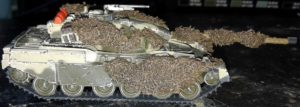
- Optics and Glass: Vallejo Model Color 70.816 (Luftwaffe Uniform)
- Cloth Roll/Air Recognition Panel Vallejo Model Color 70.956 (Light Orange)
- Jerrycans and MG Ammo boxes Vallejo Model Color 70.889 (Olive Brown)
- Fire Extinguisher bodies and Tail Reflectors Vallejo Model Color 70.957 (Flat Red)
- Exhaust Pipes Vallejo Model Color 70.822 (German Camo Black), then half covered with Vallejo Model Color 70.826 (German Camo Medium Brown), followed by covering half of the 70.826 with Vallejo Panzer Aces 301 (Light Rust) to make them appear slightly rusty.
- Commander’s MG Vallejo Model Color 70.863 (Gunmetal Grey)
- Fire Extinguisher heads Vallejo Model Color 70.865 (Oily Steel)
- Headlights and Commander’s Spot lamp Vallejo Model Color 70.997 (Silver)
Step 16: I coat the cloth roll, Jerrycans, Thermal Sleeve and MG with Vallejo Game Color 73.201 (Black Wash) After the wash is dry I repaint the Thermal Sleeve, Jerrycans and cloth roll with the same colours as before, making sure to leave the deepest recesses black.
Step 17: I spray coat the whole model with a gloss varnish.
Step 18: Once the gloss coat has set, I then cover the model with a dark brown enamel wash, in this case Tamiya Panel Line Accent Color (Dark Brown)
Ste p 19: Leaving the enamel wash to dry but not set (Usually 24-48 hours) I then clean most of the enamel off with white spirits using an old brush and cotton buds.
Letting the enamel getting to the mostly dry point, allows you to clean off most surfaces while leaving it deposited in around detail, giving your model shading and delineation. I left the cleaned model to set and dry for 48-72 hours, then gave it a full covering of matte varnish.
Step 20: Once the matte varnish dried I then loaded my airbrush with a light dusty colour (in this case Tamiya XF55 Deck Tan – However any light dusty coloured paint will suffice). I then sprayed a very light mist over the entire model to simulate the dust from an arid environment covering everything on the vehicle … be careful with this step, less is most certainly more. With the dusting done, I then concentrated more of this colour on lower portions of the model, to simulate old dust kicked up by the vehicle as it moves.
Step 21: To simulate dust that has been more freshly kicked up by the vehicle I loaded my airbrush up with a slightly darker dust colour (in this case Tamiya XF78 Wooden Deck Tan – however any dust colour will suffice). With this application of fresh dust, I concentrate entirely on the lower surfaces of the model.
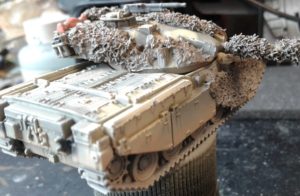
Step 22: To finish making this Tank look like it is fresh out of action, I select a few obvious run off points around the model, from which I apply a few streaks of Vallejo Environment 73.824 (Streaking Grime) to simulate various types of grime flowing down angled surfaces from light rain. Then I apply a final coat of matte varnish … and job done.
And the finished product:
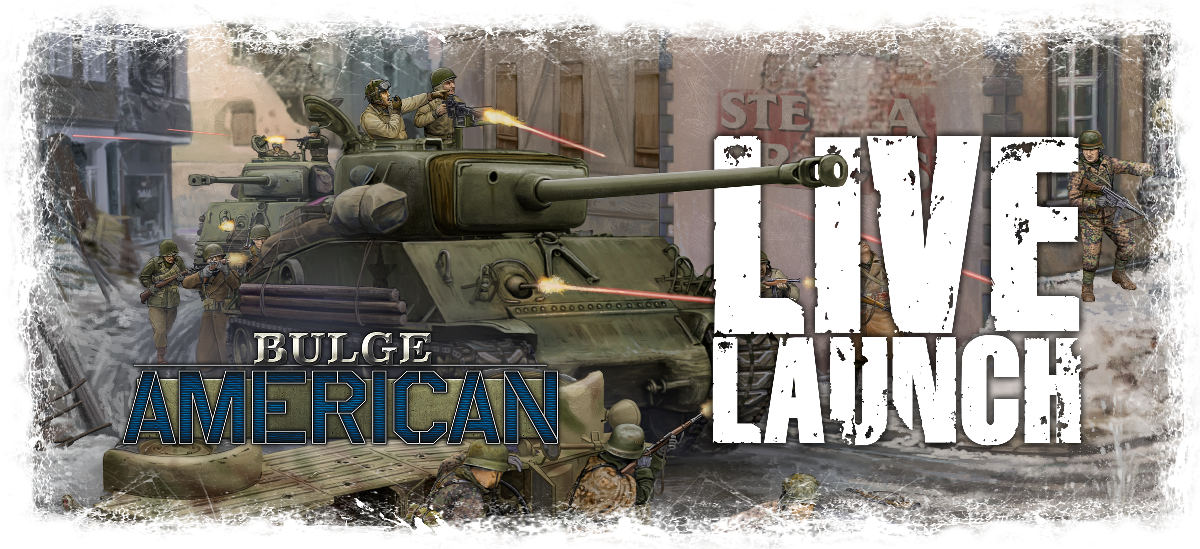
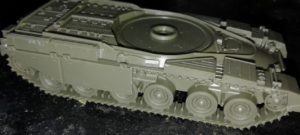
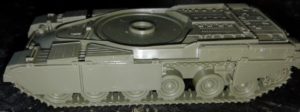
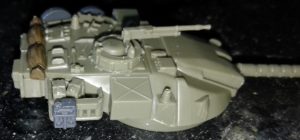
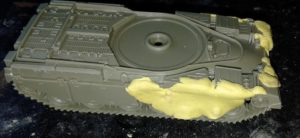
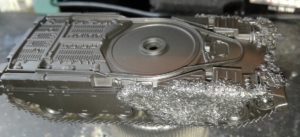
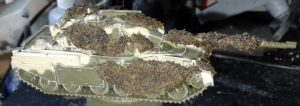
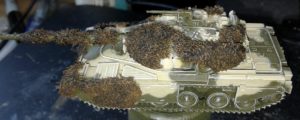
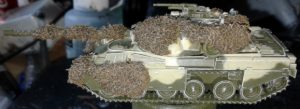

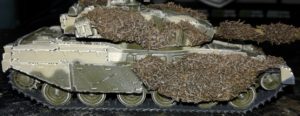
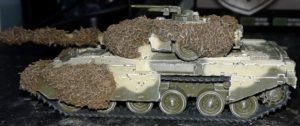
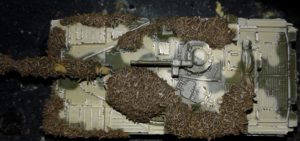
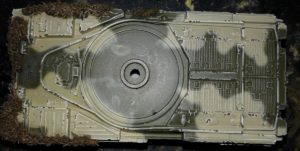
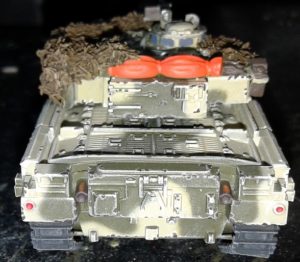
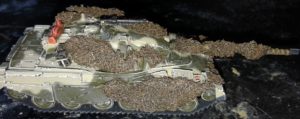
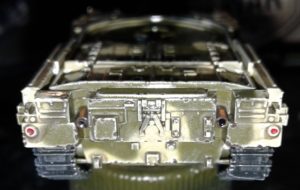
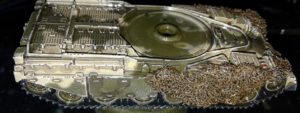
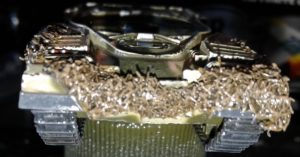
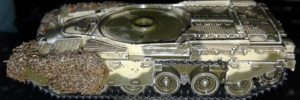
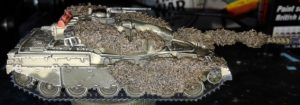
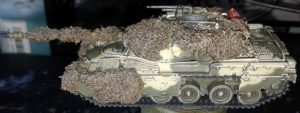
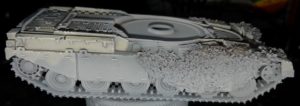

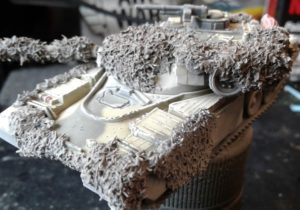
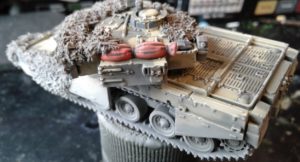
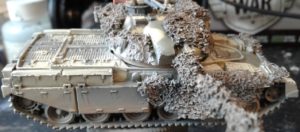
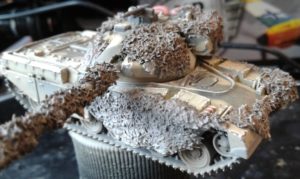
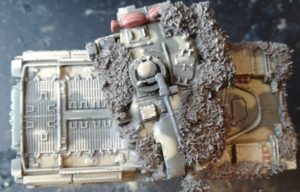
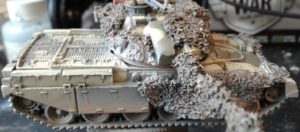
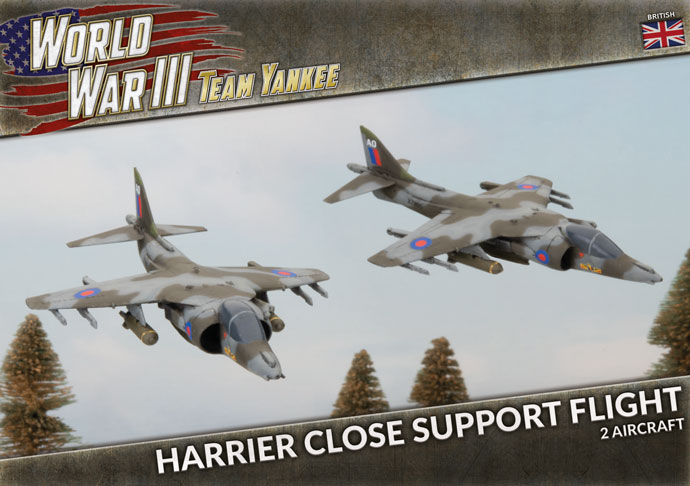
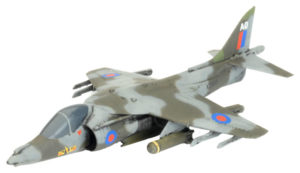 Being the first of the new WWIII: Team Yankee releases, the British are the first force to get their very own plastic aircraft, the Iron Division Harrier Close Air Support Flight. The famous ‘Jump Jet’ used by the British in World War III could swivel its exhaust nozzles down to allow it to take off vertically. As such, it was based out of supermarket car-parks, football fields, or other concealed locations close to the front line to reduce interference from Soviet intercepting aircraft, and to keep the rate of sorties higher than conventional aircraft.
Being the first of the new WWIII: Team Yankee releases, the British are the first force to get their very own plastic aircraft, the Iron Division Harrier Close Air Support Flight. The famous ‘Jump Jet’ used by the British in World War III could swivel its exhaust nozzles down to allow it to take off vertically. As such, it was based out of supermarket car-parks, football fields, or other concealed locations close to the front line to reduce interference from Soviet intercepting aircraft, and to keep the rate of sorties higher than conventional aircraft.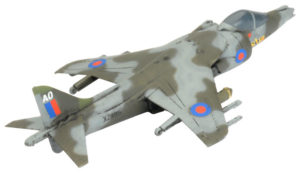 The Harrier Close Air Support Flight is an effective attack aircraft, boasting both the 30mm Aden gun and the BL-755 cluster bombs. The Harrier’s role in destroying lighter vehicles, helicopters, and dropping cluster bombs on infantry is a key support role, made all the more easy to model, paint, and field, with the new plastic kit.
The Harrier Close Air Support Flight is an effective attack aircraft, boasting both the 30mm Aden gun and the BL-755 cluster bombs. The Harrier’s role in destroying lighter vehicles, helicopters, and dropping cluster bombs on infantry is a key support role, made all the more easy to model, paint, and field, with the new plastic kit.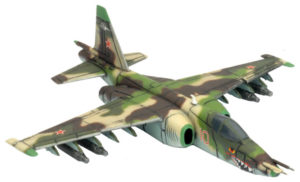 The SU-25 Frogfoot The Sukhoi Su-25 Frogfoot, known to its crew as the Grach (‘Rook’), is the modern-day equivalent of the legendary WWII Il-2 Shturmovik. It’s tough and sturdy, able to sustain multiple hits and still bring its pilot home. Flying low and slow, it can safely attack enemy troops in close proximity to its own. The SU-25 carries an impressive array of weaponry, including air-to-surface missiles and unguided rockets, on its ten under-wing hardpoints, as well as having a twin-barrelled GSh‑30-2 30mm cannon in the nose. The KH-25 Missiles come as a resin cast set of add-on pieces to make modelling your full kitted out Frogfoot easy.
The SU-25 Frogfoot The Sukhoi Su-25 Frogfoot, known to its crew as the Grach (‘Rook’), is the modern-day equivalent of the legendary WWII Il-2 Shturmovik. It’s tough and sturdy, able to sustain multiple hits and still bring its pilot home. Flying low and slow, it can safely attack enemy troops in close proximity to its own. The SU-25 carries an impressive array of weaponry, including air-to-surface missiles and unguided rockets, on its ten under-wing hardpoints, as well as having a twin-barrelled GSh‑30-2 30mm cannon in the nose. The KH-25 Missiles come as a resin cast set of add-on pieces to make modelling your full kitted out Frogfoot easy.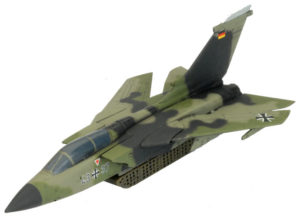 The Tornado is the third plastic kit being made available right off the bat for WWIII: Team Yankee. The Tornado is a two spruce plastic kit, with a plastic cockipit, and a resin MW-1 Submunition Dispenser cast by us to add to the kit. The main role of the Tornado is as an Interdictor Strike (IDS) aircraft. The Tornado is armed with two internally mounted 27mm Mauser BK-27 auto-cannons and two AIM-9 Sidewinder missiles for self-defence. It can carry a variety of conventional bombs, as well as the MW-1 submunition dispenser that drops a variety of munitions, including the KB44 anti tank bomblet.
The Tornado is the third plastic kit being made available right off the bat for WWIII: Team Yankee. The Tornado is a two spruce plastic kit, with a plastic cockipit, and a resin MW-1 Submunition Dispenser cast by us to add to the kit. The main role of the Tornado is as an Interdictor Strike (IDS) aircraft. The Tornado is armed with two internally mounted 27mm Mauser BK-27 auto-cannons and two AIM-9 Sidewinder missiles for self-defence. It can carry a variety of conventional bombs, as well as the MW-1 submunition dispenser that drops a variety of munitions, including the KB44 anti tank bomblet. One of the biggest additions to the British WWIII book (in my own humble opinion), is the inclusion of the FV510 Warrior. A massive improvement over the FV432 in a whole whack of ways. With the addition of the Warrior the British army now have the personnel carriers to support their infantry
One of the biggest additions to the British WWIII book (in my own humble opinion), is the inclusion of the FV510 Warrior. A massive improvement over the FV432 in a whole whack of ways. With the addition of the Warrior the British army now have the personnel carriers to support their infantry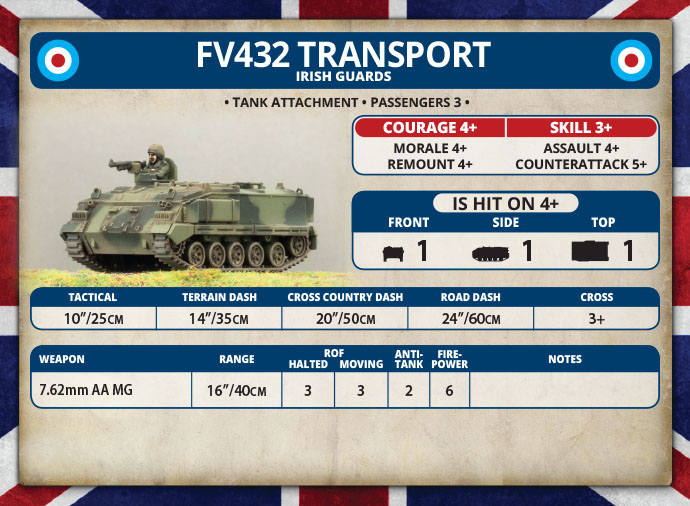 My go-to force for WWIII ever since the Brits were released; the British Mechanised Infantry force were rock-solid in defence, able to bring a number of Milan Missiles to bear against their opponent, backed up by the effective Carl Gustav recoilless launchers should any Warsaw Pact medium tanks get foolish enough to assault the dug-in positions. But what of the actual 432s themselves? Well, I will be perfectly honest here, my 432s almost never saw the table; the risk of the paper-thin armour, lack of armament (not even having the ability to mount a Milan), led to them being used as quick-dash taxis if needed. I would mount up, dash them as quickly and safely as I could, before dumping the infantry off next turn and getting the 432s as far away (usually off the table) as I could to prevent them being easy targets for enemy APCs/AFVs.
My go-to force for WWIII ever since the Brits were released; the British Mechanised Infantry force were rock-solid in defence, able to bring a number of Milan Missiles to bear against their opponent, backed up by the effective Carl Gustav recoilless launchers should any Warsaw Pact medium tanks get foolish enough to assault the dug-in positions. But what of the actual 432s themselves? Well, I will be perfectly honest here, my 432s almost never saw the table; the risk of the paper-thin armour, lack of armament (not even having the ability to mount a Milan), led to them being used as quick-dash taxis if needed. I would mount up, dash them as quickly and safely as I could, before dumping the infantry off next turn and getting the 432s as far away (usually off the table) as I could to prevent them being easy targets for enemy APCs/AFVs.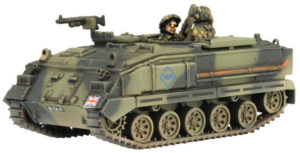 Strengths: Larger units (by comparison), for less points, plenty of Milan support
Strengths: Larger units (by comparison), for less points, plenty of Milan support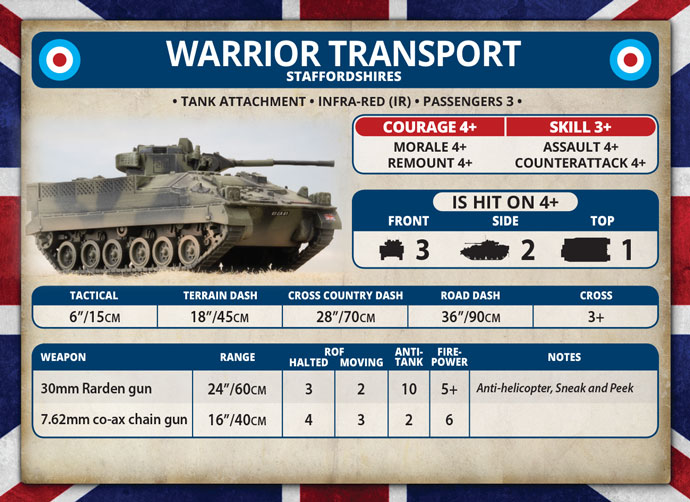 BMP-2, Marder, AMX-10P; Now the Warrior joins the ranks of decently armed IFVs. The effective 30mm Rarden gun gives the Warrior a fantastic amount of offensive power, combined with the anti- helicopter ability to keep pesky Hinds at bay.
BMP-2, Marder, AMX-10P; Now the Warrior joins the ranks of decently armed IFVs. The effective 30mm Rarden gun gives the Warrior a fantastic amount of offensive power, combined with the anti- helicopter ability to keep pesky Hinds at bay.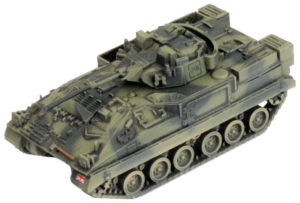 That’s the armament, but how is the armour? The regular Warrior is 5/3/1; a cut above the other IFVs in the bracket, and will remain one of the better armoured IFVs until the Yankees get the Bradley, and the Soviets get the BMP-3. But wait, ‘regular’? What do you mean ‘regular’? Well, the Warrior did come with an applique armour package, placing spaced armour round the sides. What is this going to do for the Warrior?
That’s the armament, but how is the armour? The regular Warrior is 5/3/1; a cut above the other IFVs in the bracket, and will remain one of the better armoured IFVs until the Yankees get the Bradley, and the Soviets get the BMP-3. But wait, ‘regular’? What do you mean ‘regular’? Well, the Warrior did come with an applique armour package, placing spaced armour round the sides. What is this going to do for the Warrior?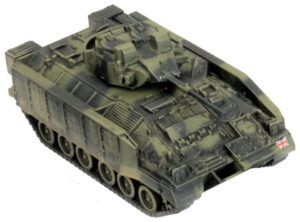 Strengths: 30mm Gun with anti-helicopter makes it a threat to most enemy forces, armour is effective against small arms, and infantry-carried anti-tank weapons
Strengths: 30mm Gun with anti-helicopter makes it a threat to most enemy forces, armour is effective against small arms, and infantry-carried anti-tank weapons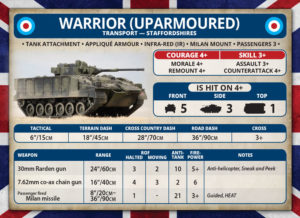 Okay, so maybe I haven’t done a complete comparison of the two forces, but I have slipped in some of the newer kit in the book to give them a run-out. As you can see the main formation for the Warrior Company is a lot smaller than the FV432 Formation (and I didn’t even give them the Uparmoured option!). Only two platoons of infantry, the mortars and MCTs are gone, as well as the anchors that were the Chieftains.
Okay, so maybe I haven’t done a complete comparison of the two forces, but I have slipped in some of the newer kit in the book to give them a run-out. As you can see the main formation for the Warrior Company is a lot smaller than the FV432 Formation (and I didn’t even give them the Uparmoured option!). Only two platoons of infantry, the mortars and MCTs are gone, as well as the anchors that were the Chieftains.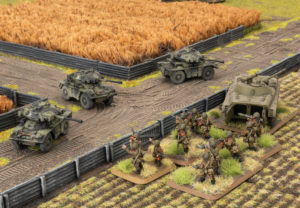 Today I’d like to discuss one of the most radical changes of all – the Fox.
Today I’d like to discuss one of the most radical changes of all – the Fox.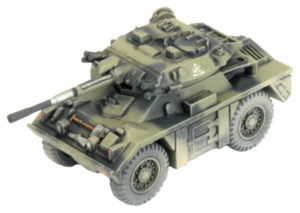 As a cost effective scout vehicle, the Fox hits hard.
As a cost effective scout vehicle, the Fox hits hard.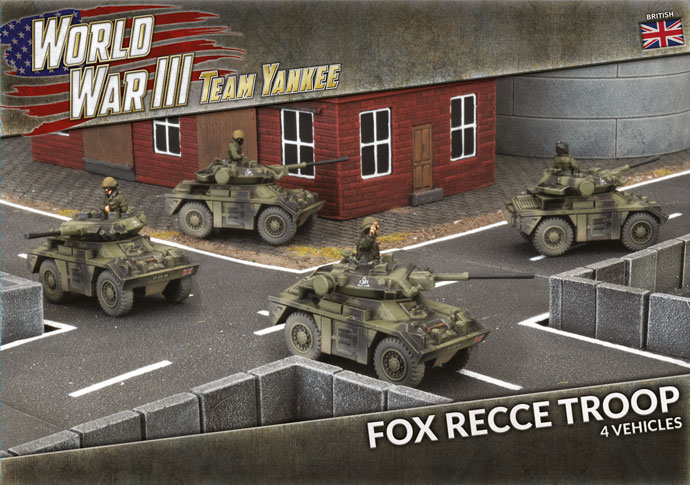 Where the Fox really shines is Road Dash of 48”/120cm compared to Scimitar 36”/90cm. With huge road networks in western Europe, this road dash is a fantastic improvement and really helps with the improved points level. There is no reason you should be going offroad as the road mobility
Where the Fox really shines is Road Dash of 48”/120cm compared to Scimitar 36”/90cm. With huge road networks in western Europe, this road dash is a fantastic improvement and really helps with the improved points level. There is no reason you should be going offroad as the road mobility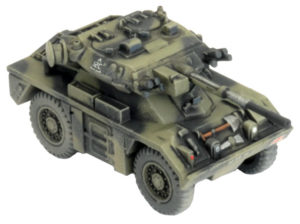 One fun fact about the Fox is that small numbers were used for airmobile support of British airborne forces. You can do this by choosing the support box option as noted above and use in support of an Airmobile Formation. Historically the Fox could even be parachuted into an operational area, giving the British Army a lightweight and fast support vehicle for their light airmobile forces.
One fun fact about the Fox is that small numbers were used for airmobile support of British airborne forces. You can do this by choosing the support box option as noted above and use in support of an Airmobile Formation. Historically the Fox could even be parachuted into an operational area, giving the British Army a lightweight and fast support vehicle for their light airmobile forces.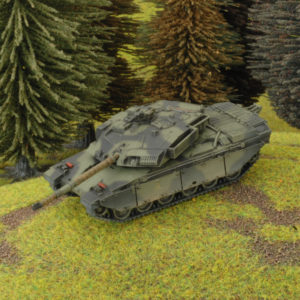 My current British army is based around a Chieftain squadron with a full 14 uparmoured Stillbrew Chieftains, some Swingfire missiles, a couple of Scorpions, a platoon of infantry and a little support. It’s a good little force, and I’m quite happy with its performance. However, my Chieftains have been usurped as the biggest tanks on the battlefield! The Challenger is even bigger!
My current British army is based around a Chieftain squadron with a full 14 uparmoured Stillbrew Chieftains, some Swingfire missiles, a couple of Scorpions, a platoon of infantry and a little support. It’s a good little force, and I’m quite happy with its performance. However, my Chieftains have been usurped as the biggest tanks on the battlefield! The Challenger is even bigger!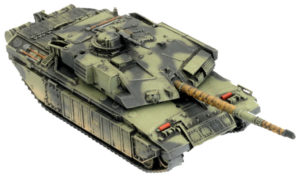
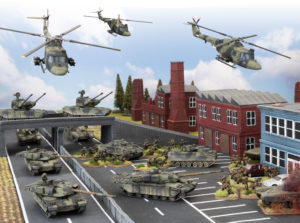
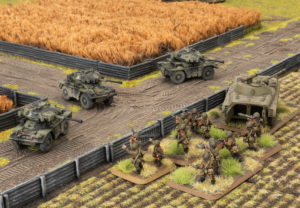 I do think I’ll manage to resist the last two new plastic kits, the Fox armoured car and the MLRS rocket launcher. I’m tempted to get them to make into objectives, but they don’t really fit in the theme of my force. I already have a pair of Scorpions for reconnaissance, so the Fox, although cute, isn’t really needed, despite being a touch cheaper for four. The MLRS is pretty awesome for shutting down infantry with its big Salvo template and each launcher counting as two weapons, but I prefer to focus a little more, so my tanks don’t actually have any artillery support — although thinking about it, two MLRS for the price of another Chieftain might actually be a good idea…
I do think I’ll manage to resist the last two new plastic kits, the Fox armoured car and the MLRS rocket launcher. I’m tempted to get them to make into objectives, but they don’t really fit in the theme of my force. I already have a pair of Scorpions for reconnaissance, so the Fox, although cute, isn’t really needed, despite being a touch cheaper for four. The MLRS is pretty awesome for shutting down infantry with its big Salvo template and each launcher counting as two weapons, but I prefer to focus a little more, so my tanks don’t actually have any artillery support — although thinking about it, two MLRS for the price of another Chieftain might actually be a good idea…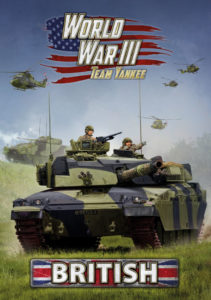 with Wayne Turner, Battlefront NZ
with Wayne Turner, Battlefront NZ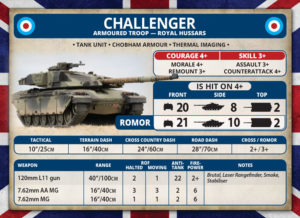
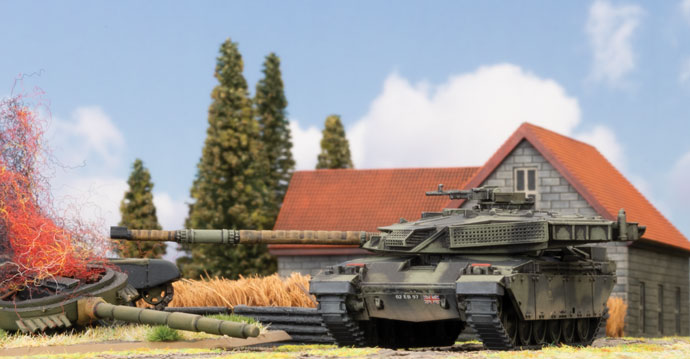 We have also included the option for ROMOR armour, which consisted of explosive reactive armour added to the front hull armour, and Chobham composite skirts in place of the bazooka skirts. This is an armoured package that was developed to apply to the Challenger in times of war to give the tank further protection.
We have also included the option for ROMOR armour, which consisted of explosive reactive armour added to the front hull armour, and Chobham composite skirts in place of the bazooka skirts. This is an armoured package that was developed to apply to the Challenger in times of war to give the tank further protection.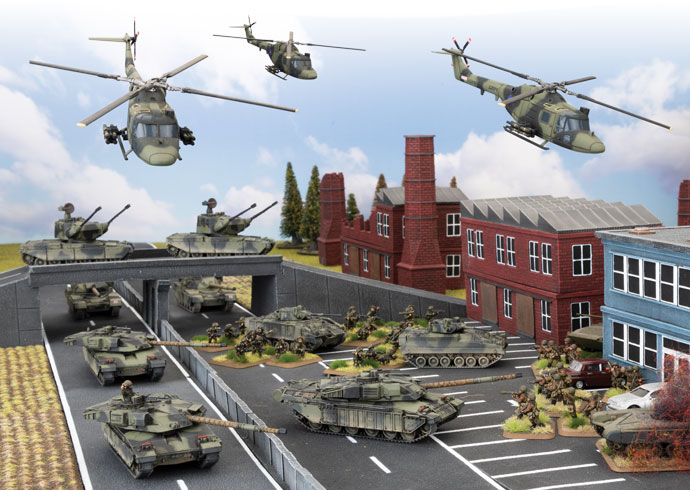
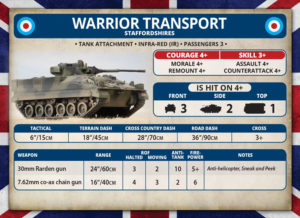 The Warrior was also used to carry the battalions Milan anti-tank guided missile teams. These two units either allow you to field the Warrior as a transport of the Milan missiles, or with the Milan mounted on the Warriors to be fired from the vehicle. The Warrior Anti-tank Section has the additional armour of the Up armoured version of the IFV as the Milan mounts were introduced with the additional armour package.
The Warrior was also used to carry the battalions Milan anti-tank guided missile teams. These two units either allow you to field the Warrior as a transport of the Milan missiles, or with the Milan mounted on the Warriors to be fired from the vehicle. The Warrior Anti-tank Section has the additional armour of the Up armoured version of the IFV as the Milan mounts were introduced with the additional armour package.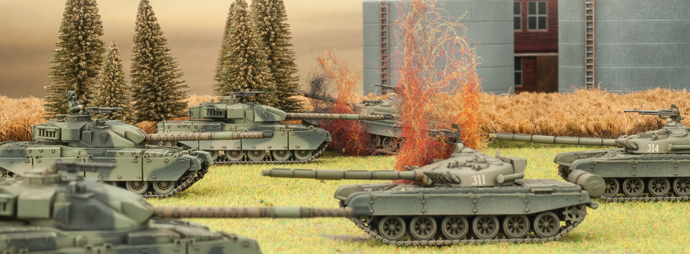
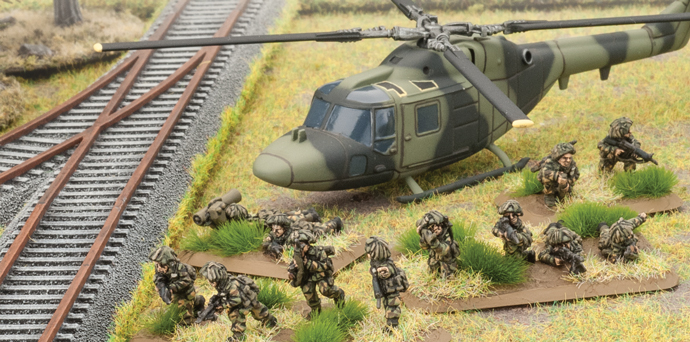 The formation comes with two Lynx Airmobile Platoons and a Lynx Milan Platoon for anti-tank support. The Lynx Airmobile Platoons have the same composition as the Mechanised Platoon, replacing the armoured transports with Lynx Transport Helicopters.
The formation comes with two Lynx Airmobile Platoons and a Lynx Milan Platoon for anti-tank support. The Lynx Airmobile Platoons have the same composition as the Mechanised Platoon, replacing the armoured transports with Lynx Transport Helicopters.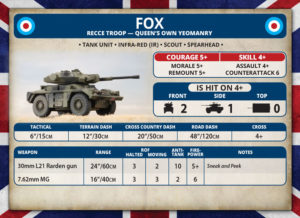
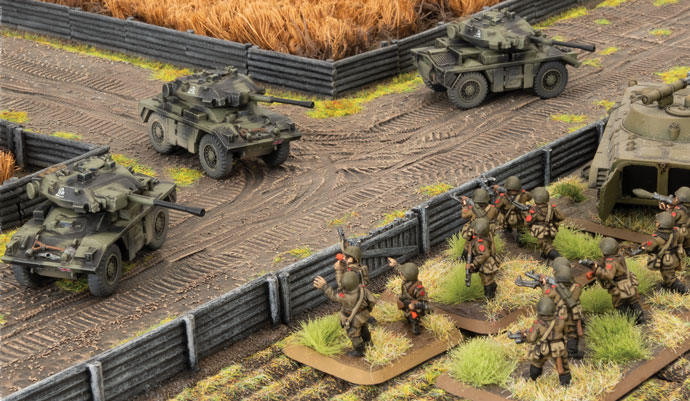
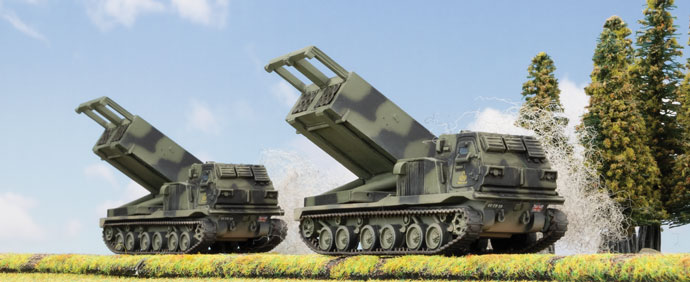
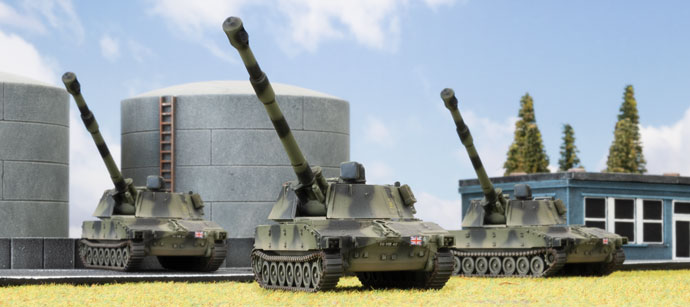
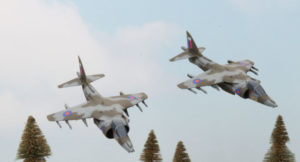 To destroy tanks from the air the British also employ the TOW Lynx HELARM Flight. The Lynx HELARM is armed with the American TOW anti-tank guided missile with an HEAT anti-tank rating of 21. The Lynx HELARM uses the Hunter-killer rule that allows it to use terrain for concealment and remain Gone to Ground unless it shoots.
To destroy tanks from the air the British also employ the TOW Lynx HELARM Flight. The Lynx HELARM is armed with the American TOW anti-tank guided missile with an HEAT anti-tank rating of 21. The Lynx HELARM uses the Hunter-killer rule that allows it to use terrain for concealment and remain Gone to Ground unless it shoots.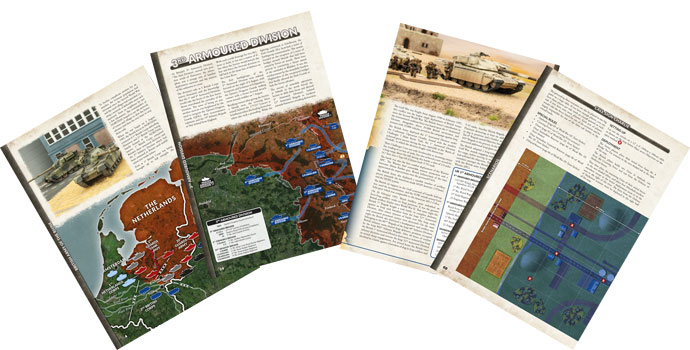

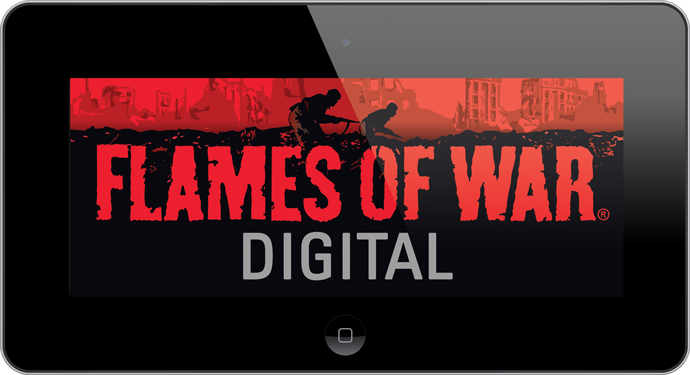
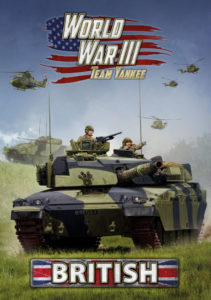 The WWIII: British Live Launch will be kicking off on Friday 14! You can expect to see articles from the WWIII: Team Yankee community celebrating the launch of the first book of the new WWIII: Team Yankee. New unit showcases, hobbying articles, battle reports, as well as the usual historical content, photographs and community content.
The WWIII: British Live Launch will be kicking off on Friday 14! You can expect to see articles from the WWIII: Team Yankee community celebrating the launch of the first book of the new WWIII: Team Yankee. New unit showcases, hobbying articles, battle reports, as well as the usual historical content, photographs and community content.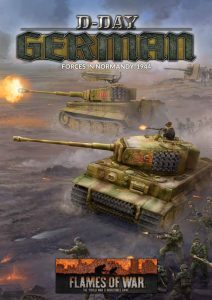 Thanks for joining us for the D-Day: German Live Launch. You can find all the content from the weekend here:
Thanks for joining us for the D-Day: German Live Launch. You can find all the content from the weekend here: